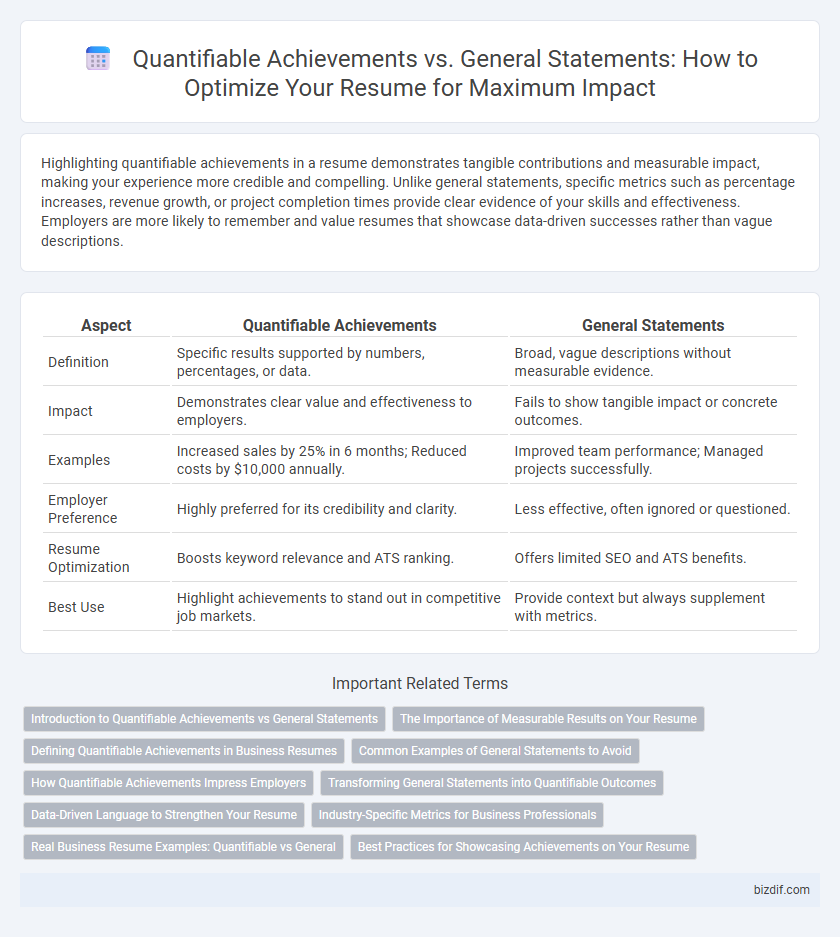Highlighting quantifiable achievements in a resume demonstrates tangible contributions and measurable impact, making your experience more credible and compelling. Unlike general statements, specific metrics such as percentage increases, revenue growth, or project completion times provide clear evidence of your skills and effectiveness. Employers are more likely to remember and value resumes that showcase data-driven successes rather than vague descriptions.
Table of Comparison
| Aspect | Quantifiable Achievements | General Statements |
|---|---|---|
| Definition | Specific results supported by numbers, percentages, or data. | Broad, vague descriptions without measurable evidence. |
| Impact | Demonstrates clear value and effectiveness to employers. | Fails to show tangible impact or concrete outcomes. |
| Examples | Increased sales by 25% in 6 months; Reduced costs by $10,000 annually. | Improved team performance; Managed projects successfully. |
| Employer Preference | Highly preferred for its credibility and clarity. | Less effective, often ignored or questioned. |
| Resume Optimization | Boosts keyword relevance and ATS ranking. | Offers limited SEO and ATS benefits. |
| Best Use | Highlight achievements to stand out in competitive job markets. | Provide context but always supplement with metrics. |
Introduction to Quantifiable Achievements vs General Statements
Quantifiable achievements provide specific, measurable results such as "increased sales by 30%" or "reduced production time by 15%," offering concrete evidence of impact. General statements, like "responsible for managing projects," lack precise metrics and fail to demonstrate the extent of accomplishments. Incorporating quantifiable achievements in a resume enhances credibility and helps employers quickly assess the value a candidate brings.
The Importance of Measurable Results on Your Resume
Highlighting quantifiable achievements on your resume significantly enhances its impact by providing concrete evidence of your skills and contributions, such as increasing sales by 30% or managing budgets exceeding $1 million. Measurable results allow hiring managers to clearly assess your effectiveness and potential value, making your application stand out among generic statements that lack specificity. Emphasizing these data-driven accomplishments improves credibility and helps tailor your resume to match key performance indicators relevant to the desired role.
Defining Quantifiable Achievements in Business Resumes
Quantifiable achievements in business resumes highlight specific, measurable results such as percentage increases in sales, cost reductions, or revenue growth, providing concrete evidence of an applicant's impact. These metrics offer employers clear insights into a candidate's effectiveness and contribution to organizational goals. Replacing vague general statements with data-driven accomplishments enhances credibility and distinguishes the resume from others.
Common Examples of General Statements to Avoid
Avoid vague statements such as "responsible for managing projects" or "worked with a team to achieve goals" that lack measurable impact. General phrases like "excellent communication skills" or "strong leadership abilities" fail to demonstrate specific accomplishments or contributions. Emphasize quantifiable achievements instead, such as "increased sales by 20% in six months" or "led a team of 10 to complete a project ahead of schedule.
How Quantifiable Achievements Impress Employers
Quantifiable achievements demonstrate measurable impact, such as "increased sales by 30%," which provides employers with concrete evidence of your abilities and contributions. Employers value specific metrics because they highlight problem-solving skills and results-driven performance. Including numbers and data in your resume transforms abstract claims into tangible proof of your success, making your application stand out in competitive job markets.
Transforming General Statements into Quantifiable Outcomes
Transforming general statements into quantifiable outcomes enhances resume impact by providing concrete evidence of accomplishments, such as increasing sales by 25% or reducing project completion time by 15 days. Employers prioritize measurable achievements that demonstrate real-world results and contribute to business goals. Including specific data points and metrics in resume bullet points significantly improves credibility and differentiates candidates in competitive job markets.
Data-Driven Language to Strengthen Your Resume
Quantifiable achievements on a resume use data-driven language that highlights measurable results, such as "increased sales by 30%" or "reduced customer complaints by 15%," providing clear evidence of impact. General statements lack specificity and fail to demonstrate the tangible value an applicant has delivered, making it harder for employers to gauge effectiveness. Incorporating metrics like percentages, dollar amounts, and timeframes strengthens your resume by showcasing concrete accomplishments that differentiate you from other candidates.
Industry-Specific Metrics for Business Professionals
Quantifiable achievements in resume writing provide clear evidence of a business professional's impact by using industry-specific metrics such as revenue growth, cost reduction percentages, or client acquisition rates. These data-driven statements outperform general assertions by demonstrating measurable success and expertise tailored to the field. Highlighting precise figures like a 20% increase in sales or a 15% decrease in operational expenses strengthens credibility and attracts employer attention.
Real Business Resume Examples: Quantifiable vs General
Real business resumes highlight quantifiable achievements by specifying metrics such as "increased sales by 30%" or "reduced operational costs by $50,000 annually," which clearly demonstrate impact. General statements like "improved sales" or "responsible for cost management" lack measurable results and fail to capture employer attention. Effective resumes use data-driven examples to convey value, making candidates stand out with concrete evidence of success.
Best Practices for Showcasing Achievements on Your Resume
Quantifiable achievements on resumes offer concrete evidence of skills and impact by including specific metrics such as increased sales by 30% or managed a budget of $500,000. Using numbers and data enhances credibility and sets applicants apart from those who rely on vague general statements like "responsible for project management." Best practices include integrating measurable results, using action verbs, and tailoring accomplishments to match job descriptions for maximum relevance and effectiveness.
Quantifiable Achievements vs General Statements Infographic

 bizdif.com
bizdif.com